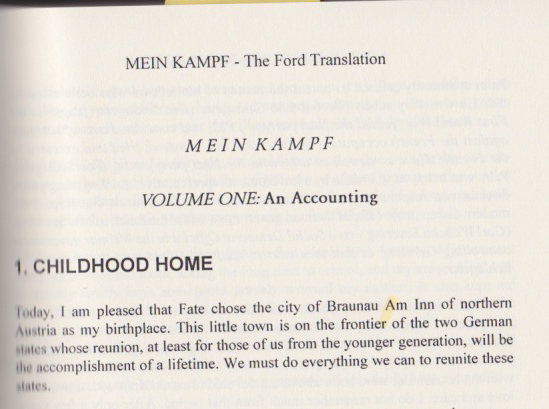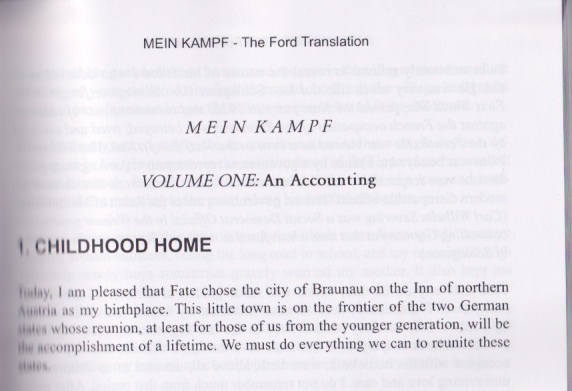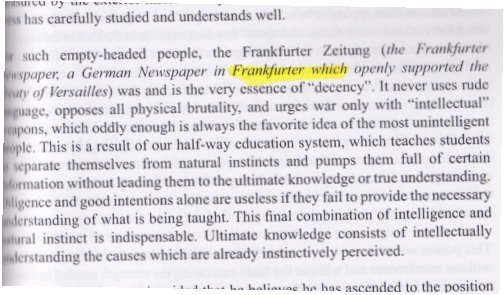
Michael Ford published a rather bad translation of Mein Kampf some years back, which he claimed to be the best of all available translations. Over the years I pointed out many errors in his work (most of which he then corrected), but various people who don’t know German have accused me of making the errors up, so I will post examples here. At the bottom of the page, I comment on why I bother.
He issues a variety of editions. Currently he offers Mein Kampf (Student’s and Teacher’s Classroom Edition). As usual, he cites his own praise of the book from his Mein Kampf: A Translation Controversy. Not surprisingly, he can’t find any reputable source or review to cite.
For more details, if you happen to stumble across this page, look at the amazon customer reviews of his various publications. I’ve pointed out many errors there.
Let’s begin with a translation choice that demonstrates Mr. Ford’s peculiar understanding of the German language. The Nazi Party’s daily newspaper was the Völkischer Beobachter. Many scholars simply leave it untranslated. The German word Volk means some combination of the ideas of race, people (in the sense of an ethnically similar people), spirit, and common culture and history — “race’ by itself is not adequate. Something like “People’s Observer” probably comes closest, but it is not really a satisfactory translation — which is why scholars usually leave it in German rather than provide a less than ideal translation.
Mr. Ford translates it as “Race Watcher.” That is a bad translation for several reasons. First, it is grammatically incorrect (although Mr. Ford for some reason thinks it sounds better to an English reader than the grammatically correct form). You’ll not find an American newspaper titled Nation Watcher. His title suggests that the newspaper focused on race, which isn’t the case. It was a daily newspaper that covered national and international events from a Nazi perspective. Turning to the second word of the title, “Beobachter” is a part of many German newspaper names. For example, the Nazi illustrated weekly was the Illustrierter Beobachter. By Mr. Ford’s thinking, that should be translated as the “Illustration Watcher.” That would be silly, almost as silly as "Race Watcher.”
Mr. Ford provides several pages of justification in his booklet that announces the excellence of his translation (pp. 98-103). He is not persuasive. If you are curious, do read those pages, and the material he appends on pp. 106-107. It doesn’t make much sense. Mr. Ford changes his text occasionally, so if you don’t find it, let me know. I’ve saved a PDF of the version referred to here.
Mr. Ford, by the way, had a curious mixed metaphor in his justification. He claimed his translation is “more easily digested by the American ear” (p. 103 of the edition circulated in July 2010). An odd thing for an ear to do. However, he’s changed that in the latest version. I have been following his revisions to that remarkable document, and find that he fairly often repairs errors I point out (never giving me credit, however).
A few examples of the errors I’ve noted. Let us begin with the the first page of his first edition:

Page 47 (original edition)
You will note “Braunau Am Inn,” which is an elementary error in German. It should be “Braunau am Inn.” Then it continues “of northern Austria.” That is an English grammatical error. One would not say “I was born in Chicago of Illinois.” “Northern Austria,” by the way, is not in Hitler’s original, but Mr. Ford thought it needed to be added.
Well, Mr. Ford prints on demand, so he repairs errors as people point them out. And he decided that the cover of his first version was rather gaudy, so he put out a new one, with some errors corrected. Let’s look at the first page of that one:

Page 47 (second edition)
You will note that he has corrected the German error, but kept the English infelicity.
I do wonder if Mr. Ford actually knows much German himself, since his translation has many errors like this one from p. 215 of the second edition:

Page 215 (second edition)
The sentence in italics is silly. German adds an “er” ending to cities before something that relates to the city. Thus, the Frankfurter Zeitung is a newspaper published in Frankfurt. I can’t easily imagine that someone with even the most rudimentary knowledge of German could make such a mistake, which turns the noble city of Frankfurt am Main into a hotdog. Mr. Ford makes that error. And many like it.
There are lots of other errors that carried over from the first to the second edition, and I may include more if anyone is interested. Contact me at bytw@calvin.edu.
Why bother with Mr. Ford’s inept translation?
It goes back to when I first discovered it — on the Wikipedia page for Mein Kampf. Mr. Ford, using the handle “Historyprof101,” had inserted praise of his translation in June 2009. I discovered that October 2009 and removed it. Since I know a fair amount about Nazi propaganda (check me out if curious), I was puzzled. I’d never heard of it. I checked amazon.com, to find that Mr. Ford had gotten some shill reviews (since removed) before publication, and was selling copies merrily. He’d self-published a book claiming his translation was wonderful, which he cited to prove his translation was wonderful. Nicely circular.
Mr. Ford was, and is, remarkably silent about his qualifications to translate Mein Kampf. He provides little information about himself. He's written other self-published books on how to avoid being scammed on e-Bay, and how to find a job if you are a felon. He also markets grammar checking software, which he either does not use himself, or does not work well, given the number of errors in his material.
I investigated his work, and found it poor. I posted a review on amazon, and promptly got all sorts of nasty comments from his friends, most of whom apparently do not know German, and think that the way to conduct an argument is to toss insults.
In short, I see my efforts as a kind of consumer protection. If people want to buy Mr. Ford’s dubious translation, they are free to do so. However, they should at least know they are buying a bad translation. Google Scholar allows one to check scholarly citations. No one with any scholarly standing has chosen to cite Ford’s translation.
It also provides interesting material for my course on persuasion and propaganda. Although Mr. Ford does not seem to know German well, he is a master of Internet promotion. He makes a fascinating case study.